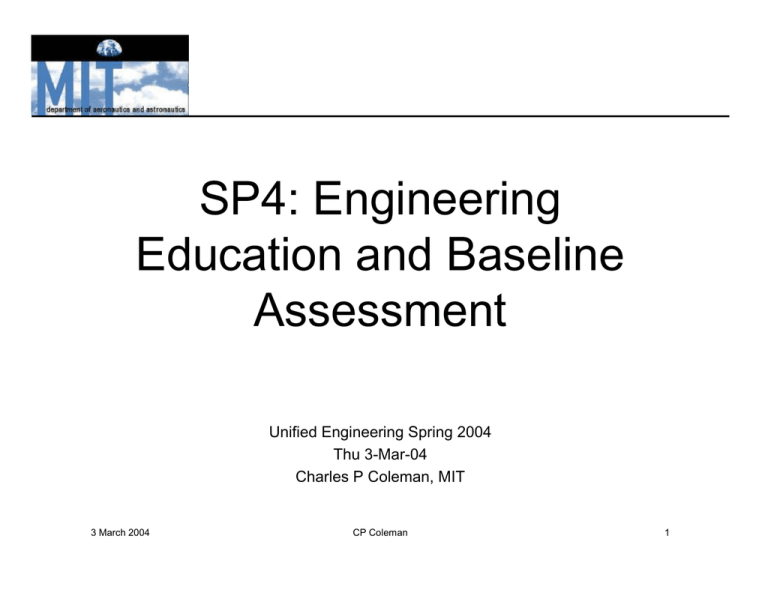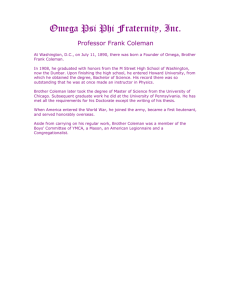Document 13475462
advertisement

SP4: Engineering Education and Baseline Assessment Unified Engineering Spring 2004 Thu 3-Mar-04 Charles P Coleman, MIT 3 March 2004 CP Coleman 1 Outline Outline • Reflections on Seering 2003 • SP4 3 March 2004 CP Coleman 2 SP4 Seering 2003: Same story! 3 March 2004 CP Coleman 3 Life Cycle: CDIO in Industry Conceive-Design-Implement-Operate Bus Case Vision 3 March 2004 Plan System Delivery Operations Propose Define Demo Deliver CP Coleman Ops 4 Why is Reform/Redefinition Needed? • Emphasis on teaching of engineering science. • De-emphasis on teaching engineering practice. • Students lacking abilities required in real world engineering situations. Widening Gap between engineering education and engineering practice. 3 March 2004 CP Coleman 5 Attributes: Desired Outcomes Boeing ABET • Good understanding of engineering science • Good understanding of design and manufacturing • Multi-disciplinary, systems perspective • Understanding of the context in which engineering is practiced. • Ability to apply knowledge • Ability to design and conduct experiments • Ability to design system, component, or process • Ability to function on multidisciplinary teams • Understanding of ethical responsibility • Understand impact of engineering in global and societal context • Ability to use techniques, skills and tools necessary for engineering practice – – – – Economics History The environment Customer and societal needs • Good communication skills • Profound understanding of the importance of teamwork 3 March 2004 CP Coleman 6 Teaching the Engineering Method? Essential Functions of an Engineer: Graduation engineers should be able to: Conceive-design-implement-operate (CDIO) Complex value-added engineering systems (Technical) In a modern team-based environment (Interpersonal) And are mature and thoughtful individuals (Personal) 3 March 2004 CP Coleman 7 Map of the new CDIO syllabus Educate students who: Process • Understand how to conceivedesign-implement-operate Product • Complex value-added engineering systems • In a modern team-based engineering environment • And are mature and thoughtful individuals 3 March 2004 4. CDIO 1. Technical 2. Personal 3. Interpersonal Team Self CP Coleman 8 CDIO Syllabus covered by System Problems Fall Spring Weekly individual assignments Semester long team assignment Self-contained assignments Interdependent assignments Progressively more complex assignments Progressively more complex assignments Integration of 1-2 disciplines Integration of 2-3+ disciplines 2.5 Professional Skills 2.4 Personal Skills 2.1 Problem Solving 2.2 Knowledge Discovery 2.3 System Thinking 3 March 2004 2.5 Professional Skills 2.4 Personal Skills 3.1Teamwork 2.1 Problem Solving 2.2 Knowledge Discovery 2.3 System Thinking 3.2 Communication CP Coleman 3.1Teamwork 3.2 Communication 9 Map of the new CDIO syllabus Educate students who: Process • Understand how to conceivedesign-implement-operate Product • Complex value-added engineering systems • In a modern team-based engineering environment • And are mature and thoughtful individuals 3 March 2004 4. CDIO 1. Technical 2. Personal 3. Interpersonal Team Self CP Coleman 13 Engineering Method Tools Design • Process • Analysis Project Mgmt • Time • Resources • Risk Teamwork • Communication • Coordination • Roles & Responsibilities • Motivation! Tools: • FRDIARRC • Design Selection Matrix Tools: • WBS • Gantt Chart Tools: • Comm Plan • Roles & Resp • Ground Rules • Effective Mtgs 3 March 2004 CP Coleman 14 Functional Requirements Design Ideas McDonald's Functional Requirements Design Idea Analysis Take orders Internet At counter terminal Cost, Time Efficiency, Course 6 Cook burgers Flame broil Nuke Fry Patent infringement? Course 22 Thermo, Course 2 Deliver burgers Delivery At the counter Dispensing machine Cost,Time, Cust Sat Efficiency, packaging Robotics, Course 2 3 March 2004 CP Coleman 15
